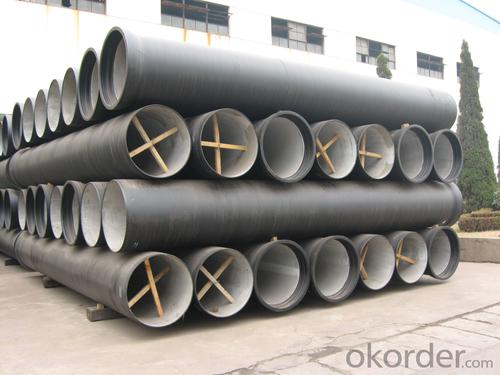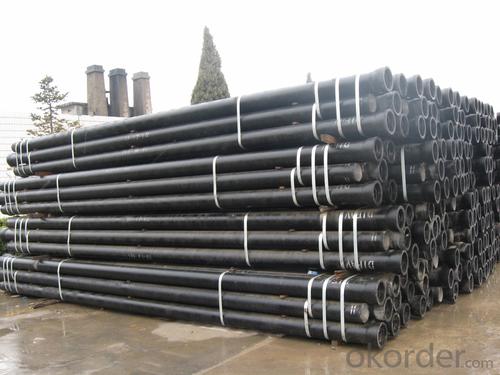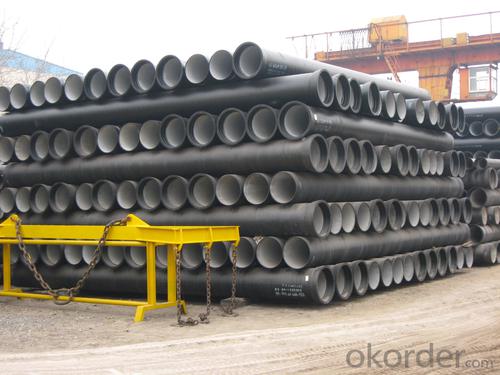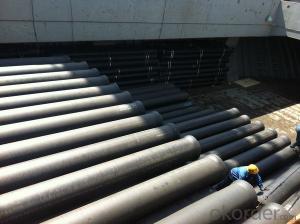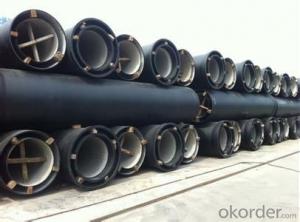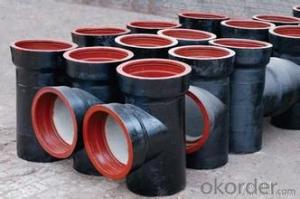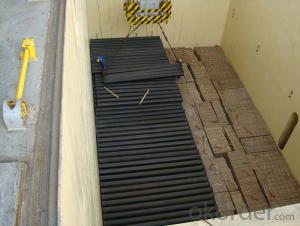DUCTILE IRON PIPE DN1200 K9
- Loading Port:
- China Main Port
- Payment Terms:
- TT OR LC
- Min Order Qty:
- -
- Supply Capability:
- -
OKorder Service Pledge
OKorder Financial Service
You Might Also Like
Specification:
1) The standard of pipe: ISO2531:1998, K9
2) Effective length: 6m
3) Inner cement line: Portland cement line as per ISO4179
4) Zinc coating: at least 130g/m2 as per ISO8179
5) Bitumen painting: at least 70um as per ISO8179
6) With 100% quantity of NBR ring, or SBR ring, or EPDM ring as per ISO4633
7) DN80mm-800mm
8) High strength, lighter than grey iron, good corrosion resistance, no furring, small flow resistance, easy fixing, long life tome about 100 yeas
9) Produced by Hangzhou chunfeng machine
10) Checked by automatic inspection equipment
11) Composition:
Chemical composition | | | | |||
Chemical composition | Ductile Cast Iron Pipe (%) | Grey iron pipe (%) | Steel pipe (%) | | | |
C | 3.5-4.0 | 3.2-3.8 | 0.1-0.2 | | | |
Si | 1.9-2.6 | 1.4-2.2 | 0.15-0.4 | | | |
Mn | 0.15-0.45 | 0.4-0.6 | 0.3-0.6 | | | |
P | ≤0.06 | ≤0.3 | 0.02-0.03 | | | |
S | ≤0.02 | ≤0.1 | 0.02-0.03 | | | |
Mg | 0.03-0.06 |
|
| | | |
12) Feature:
Mechanical properties | | | | |||
| Ductile Cast Iron Pipe | Grey Iron Pipe | Steel Pipe | | | |
Tensile Strength(Mpa) | ≥420 | 150-260 | ≥400 | | | |
Yield Strength(Mpa) | ≥300 | No Confirmation | No Confirmation | | | |
Bending Strength(Mpa) | ≥590 | 200-360 | ≥400 | | | |
Elongation (%) | ≥10 | Neglected | ≥18 | | | |
Brinell Hardness(HBS) | ≤230 | ≤230 | About 140 | | | |
13) T type mechanical joint
14) Packing: in bulk or container
- Q: What material is the cutting tool for ductile iron?
- They are all hard alloy materials, all of which are CVD coatings, but the products produced by different manufacturers will be very different.
- Q: Are ductile iron pipes resistant to root intrusion?
- Yes, ductile iron pipes are generally resistant to root intrusion due to their strong and durable composition.
- Q: Are ductile iron pipes suitable for gravity sewer systems?
- Yes, ductile iron pipes are suitable for gravity sewer systems. Ductile iron pipes have several properties that make them well-suited for this application. Firstly, ductile iron pipes have high tensile strength, which means they can withstand the weight of the soil and other loads placed on them in a gravity sewer system. This strength allows the pipes to resist deformation and maintain their structural integrity over time. Additionally, ductile iron pipes have excellent corrosion resistance. This is important in sewer systems as they are often exposed to harsh and corrosive environments. The corrosion resistance of ductile iron pipes ensures their long-term durability and reduces the need for maintenance and repairs. Furthermore, ductile iron pipes have a smooth internal surface, which allows for efficient flow of wastewater in gravity sewer systems. The smooth surface minimizes friction and prevents the accumulation of debris and sediment, reducing the risk of blockages and improving the overall performance of the system. Moreover, ductile iron pipes are highly resistant to damage from external forces such as ground movements or heavy traffic. This makes them a reliable choice for gravity sewer systems, where the pipes may be subjected to various external stresses. Overall, the combination of high tensile strength, corrosion resistance, smooth internal surface, and resistance to external forces makes ductile iron pipes a suitable and reliable choice for gravity sewer systems.
- Q: How is ductile iron pipe manufactured?
- Ductile iron pipe is manufactured through a specific process known as centrifugal casting. The process starts with the melting of iron in a furnace, where specific elements such as carbon and silicon are added to achieve the desired properties. Once the iron is melted, it is poured into a spinning mold or a die that is rotating at a high speed. As the molten iron is poured into the rotating mold, centrifugal force pushes the liquid metal towards the inner surface of the mold. This force causes the metal to solidify from the outer surface inward. This results in a pipe with a dense outer layer and a more porous inner layer. The centrifugal casting process ensures that the pipe's outer surface is free from impurities and defects, ensuring its strength and durability. After the pipe has solidified, it is removed from the mold and undergoes further processing. The pipe is cleaned, excess material is trimmed off, and any surface imperfections are removed. It is then treated with a protective coating, such as zinc or epoxy, to enhance its corrosion resistance. The final step in the manufacturing process is quality control and testing. Ductile iron pipes are subjected to various tests to ensure they meet the required standards, including hydrostatic pressure testing, dimensional inspection, and internal and external coating inspection. In summary, ductile iron pipe is manufactured through the centrifugal casting process, which involves melting iron, pouring it into a rotating mold, and allowing it to solidify under centrifugal force. The resulting pipe is then cleaned, coated, and undergoes rigorous quality control to ensure its strength, durability, and adherence to standards.
- Q: How much is a ductile iron pipe dn400?
- High quality cast iron ductile iron pipe with low phosphorus and low sulfur iron making production of blast furnace, according to the current international advanced centrifugal casting, annealing process, water-cooled metal type centrifugal pipe casting machine casting, after annealing, socket dressing, pressure test, internal lining layer of cement, cement treated lining, water and health cement lining, outer wall coated with asphalt paint, asphalt paint baking, socket antirust processing, spray marks and other procedures for the packaging, with high strength, high elongation, corrosion resistance of a body strong as iron.
- Q: Are ductile iron pipes suitable for underground applications?
- Indeed, underground applications are well-suited for ductile iron pipes. Renowned for their durability, strength, and resistance to corrosion, these pipes emerge as an excellent option for installations that lie beneath the surface. Their ability to withstand immense loads, ground shifts, and external pressure further solidifies their appropriateness for burial underground. Moreover, given the challenges associated with access and maintenance in underground scenarios, the fact that ductile iron pipes boast a lifespan of over 100 years becomes invaluable. In conclusion, the reliability and suitability of ductile iron pipes for underground applications are underscored by their robustness and longevity.
- Q: Can ductile iron pipes be used for underground chemical processing systems?
- Ductile iron pipes are generally not recommended for use in underground chemical processing systems due to their limited resistance to corrosion from various chemicals. While ductile iron pipes are known for their strength, durability, and flexibility, they are still vulnerable to corrosion when exposed to certain chemicals, especially those with high acidity or alkalinity. In underground chemical processing systems, there is a higher risk of exposure to corrosive substances that can deteriorate the ductile iron pipes over time. This can lead to leaks, cracks, and failures in the piping system, compromising its integrity and potentially causing hazardous conditions. For underground chemical processing systems, it is advisable to consider alternative materials that are more resistant to corrosion, such as stainless steel, PVC, or high-density polyethylene (HDPE) pipes. These materials offer superior chemical resistance and can withstand the harsh conditions typically present in chemical processing environments. It is crucial to consult with experts in chemical engineering, piping design, and corrosion resistance to determine the most suitable materials for underground chemical processing systems. Proper material selection is vital to ensure the longevity and safety of the piping infrastructure in such environments.
- Q: What are the different types of valves available for ductile iron pipe?
- Ductile iron pipe offers a variety of valve options, each with its own unique purpose and function. Among the most commonly used valves are: 1. Gate Valves: These valves are designed to either fully open or fully close the fluid flow in the pipe. They feature a gate-like mechanism that permits or blocks the passage of fluid depending on the valve's position. 2. Butterfly Valves: Butterfly valves are quarter-turn valves that utilize a circular disc to control the flow. When open, the disc aligns parallel to the flow, resulting in minimal pressure drop. Conversely, when closed, the disc aligns perpendicular to the flow, effectively stopping the fluid. 3. Ball Valves: Ball valves consist of a spherical disc with a central hole, known as a ball. When the valve is open, the ball is positioned to allow fluid to pass through the hole. To close the valve, the ball is rotated to obstruct the flow. 4. Check Valves: Check valves are specifically designed to permit fluid flow in one direction only, preventing backflow. They incorporate a flap or disc that opens when the flow is in the correct direction and closes to halt the flow when reversal occurs. 5. Plug Valves: Plug valves feature a cylindrical or conical plug with a through-hole that can be rotated to regulate the flow. When open, the hole aligns with the pipe, enabling fluid to pass. Closing the valve positions the hole perpendicular to the pipe, blocking the flow. 6. Pressure Reducing Valves: These valves serve the purpose of controlling and reducing the pressure of fluid within the pipe. They employ a mechanism that adjusts the flow area to achieve pressure reduction. 7. Pressure Sustaining Valves: Pressure sustaining valves are utilized to maintain a specific pressure level within the pipe. They automatically adjust the flow area to sustain the desired pressure. 8. Air Release Valves: Air release valves are employed to eliminate trapped air within the pipe. They allow air to escape while preventing fluid leakage. These examples demonstrate the diverse range of valve options available for ductile iron pipe. The selection of a suitable valve depends on factors such as the application, flow requirements, and desired functionality.
- Q: Can ductile iron pipe be used for stormwater management systems?
- Yes, ductile iron pipe can be used for stormwater management systems. Ductile iron pipe is commonly used in various applications, including stormwater drainage systems. It is known for its strength, durability, and resistance to corrosion, making it ideal for withstanding the harsh conditions of stormwater management. Additionally, ductile iron pipe is easily installed and maintained, making it a cost-effective choice for stormwater management systems. Overall, ductile iron pipe is a reliable and suitable option for constructing stormwater management systems.
- Q: Can ductile iron pipes be used for irrigation systems in agricultural fields?
- Yes, ductile iron pipes can be used for irrigation systems in agricultural fields. Ductile iron pipes are known for their durability, strength, and corrosion resistance, making them a suitable choice for various applications, including irrigation systems. These pipes are capable of withstanding high pressures and can handle the demands of transporting water for irrigation purposes. Additionally, the ductile iron material is resistant to environmental factors such as UV rays, soil chemicals, and temperature fluctuations, ensuring a long lifespan for the pipes. Furthermore, ductile iron pipes have excellent flow characteristics, allowing for efficient water distribution throughout the agricultural fields. Overall, ductile iron pipes are a reliable and robust option for irrigation systems in agricultural fields, providing a sustainable and efficient solution for water distribution.
Send your message to us
DUCTILE IRON PIPE DN1200 K9
- Loading Port:
- China Main Port
- Payment Terms:
- TT OR LC
- Min Order Qty:
- -
- Supply Capability:
- -
OKorder Service Pledge
OKorder Financial Service
Similar products
Hot products
Hot Searches
Related keywords



